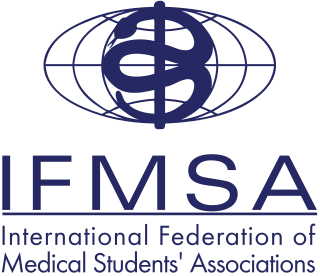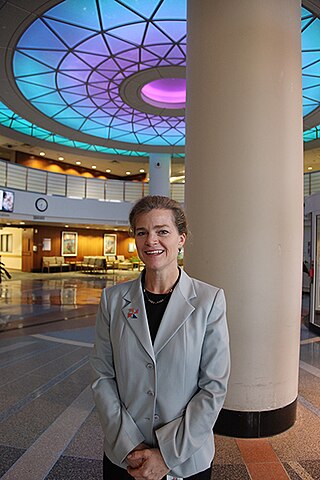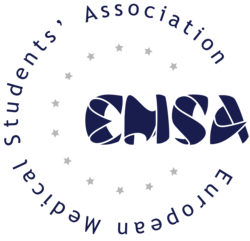
A podiatrist is a medical professional devoted to the treatment of disorders of the foot, ankle, and related structures of the leg. The term originated in North America but has now become the accepted term in the English-speaking world for all practitioners of podiatric medicine. The word chiropodist was previously used in the United States, but it is now regarded as antiquated.

Uniformed Services University of the Health Sciences (USU) is a health science university and professional school of the U.S. federal government. The primary mission of the school is to prepare graduates for service to the U.S. at home and abroad as uniformed health professionals, scientists and leaders; by conducting cutting-edge, military-relevant research; by leading the Military Health System in key functional and intellectual areas; and by providing operational support to units around the world.
Translational medicine develops the clinical practice applications of the basic science aspects of the biomedical sciences; that is, it translates basic science to applied science in medical practice. It is defined by the European Society for Translational Medicine as "an interdisciplinary branch of the biomedical field supported by three main pillars: benchside, bedside, and community". The goal of translational medicine is to combine disciplines, resources, expertise, and techniques within these pillars to promote enhancements in prevention, diagnosis, and therapies. Accordingly, translational medicine is a highly interdisciplinary field, the primary goal of which is to coalesce assets of various natures within the individual pillars in order to improve the global healthcare system significantly.
A medical specialty is a branch of medical practice that is focused on a defined group of patients, diseases, skills, or philosophy. Examples include those branches of medicine that deal exclusively with children (paediatrics), cancer (oncology), laboratory medicine (pathology), or primary care. After completing medical school or other basic training, physicians or surgeons and other clinicians usually further their medical education in a specific specialty of medicine by completing a multiple-year residency to become a specialist.

The International Federation of Medical Students' Associations (IFMSA) is a non-governmental organization representing associations of medical students. It was founded in May 1951 and currently maintains 139 member organizations from 130 countries around.

Gunther Eysenbach is a German-Canadian researcher on healthcare, especially health policy, eHealth, and consumer health informatics.
The Standing Committee of European Doctors represents national medical associations across Europe.

The Medical University of Varna (MU-Varna) is a Bulgarian state school for higher education dedicated to training specialists in the fields of medicine and healthcare who graduate with the educational and qualification degrees of Master, Bachelor and Professional Bachelor. The university has a legal entity status with the following scope of business activities: training of cadres and professional qualification; training of PhD students; postgraduate education for medical and non-medical cadres; conducting medical diagnosis, prevention, consultation, rehabilitation, and expert services at the university hospitals; scientific research and applied sciences; international cooperation in the field of education and science; administrative, social, sport, publishing, information, and other activities.

The College of Biological Sciences (CBS) is one of seven freshman-admitting colleges at the University of Minnesota. Established in 1869 as the College of Science, the College of Biological Science is now located across both the Minneapolis and the St. Paul campuses. As of June 29, 2023, the dean of the College of Biological Sciences is Dr. Saara J DeWalt.
European Forum of Medical Associations (EFMA) is an international organisation with an aim to establish dialogue and cooperation between National Medical Associations (NMAs) and World Health Organization (WHO) in the European Region to improve the quality of health and health care in Europe; promote the exchange of information and ideas between NMAs and WHO; integrate appropriate aspects of policies for health for all into basic, postgraduate and continuing medical education; and as appropriate formulate consensus policy statements on health issues.
A clinical officer (CO) is a gazetted officer who is qualified and licensed to practice medicine.

The International Pharmaceutical Students' Federation (IPSF) is a non-governmental, non-political and non-religious organisation that represents pharmaceutical students, pharmacy students and recent graduates from all over the world. It was founded in 1949 and it is the oldest faculty-based student organisation. IPSF represents over 500,000 individuals in more than 100 countries with 127 different representative pharmacy student member organisations.
The Teddy Bear Hospital Project (TBHP) is an international medical initiative organized by the International Federation of Medical Students' Associations (IFMSA) and the European Medical Students' Association (EMSA) that aims to reduce children's fears of medical procedures and staff. It originated in Norway in 2000 and by 2006 had spread to 28 countries. With the support of parents, teachers, and doctors, it is organized and run primarily by medical students.

Riga Stradiņš University (RSU) is a public university located in the city of Riga, Latvia. The name Stradiņš in the university's title refers to the Stradiņš family who have had a significant influence on the course of community and academic life in Latvia for over a century.
The Complementary and Alternative Medicine Program was created in 2003 by Georgetown University Medical Center in response to a nationwide NIH-funded educational initiative to incorporate CAM into medical and graduate school curricula. This program is focused on training students to objectively assess the safety and efficacy of various CAM modalities such as acupuncture, massage, herbs and supplements, and mind-body interactions and introducing scientific rigor to much needed research in this field.

The Academy of Family Physicians of India (AFPI) is a professional academic society, registered as a non-profit organization in India. AFPI has been founded with the aim of promoting family medicine and primary healthcare. Family medicine is the practicing speciality and academic discipline of majority Indian doctors. Although there were GP associations such as IMA CGP and FFPAI have been existing for several decades, there was no forum for spearheading development of academic family medicine in India. AFPI is an equivalent organization to American Academy of Family Physicians, College of Family Physicians of Canada, Royal College of General Practitioners, Royal Australian College of General Practice for India.

The LudovikaUniversity of Public Service is a higher educational institution in Budapest, Hungary. Established in 2012, it is one of the youngest universities in Central and Eastern Europe; however, its faculties as former independent colleges look back much earlier.

Julie Story Byerley is an American physician who is known as a leader in the fields of medical education and pediatrics. Byerley has served as a clinical professor and Vice Dean for Education for the University of North Carolina at Chapel Hill School of Medicine. She currently serves as President and Dean of Geisinger Commonwealth School of Medicine as well as Executive Vice President and Chief Academic Officer for Geisinger Health System.

Malta has a long history of providing publicly funded health care. The first hospital recorded in the country was already functioning by 1372. Today, Malta has both a public healthcare system, known as the government healthcare service, where healthcare is free at the point of delivery, and a private healthcare system. Malta has a strong general practitioner-delivered primary care base and the public hospitals provide secondary and tertiary care. The Maltese Ministry of Health advises foreign residents to take out private medical insurance.

The Institute of Industrial and Systems Engineers (IISE), formerly the Institute of Industrial Engineers, is a professional society dedicated solely to the support of the industrial engineering profession and individuals involved with improving quality and productivity.















